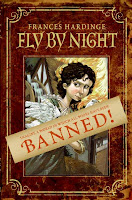 This book was NOT what I expected at all. I've been avoiding it because I thought the plot was about censorship (a logical assumption from the cover of the book), and I've had my fill of the censorship discussion already.
This book was NOT what I expected at all. I've been avoiding it because I thought the plot was about censorship (a logical assumption from the cover of the book), and I've had my fill of the censorship discussion already.Turns out, the cover is misleading--at least in the assumptions it caused me to draw. (and the idea that "you shouldn't judge a book by it's cover" is ridiculous...why else would that "Banned" banner appear if not to catch my attention and lead me to judge the book. Someone in marketing should see to removing that "Banned" logo before it keeps other people from reading the book, not because it's "banned" but because they don't want to suffer through yet another sermon on censorship. It totally skewed my perception of the book in a Very Non Flattering way. I realize that children might find the "banned" logo inviting, but are they the ones with purchasing power when it comes to children's books? Sigh. I know. I know. Librarians (who are quite Taken with the censorship battle) do have purchasing power. So maybe this edition was lobbied at them. (and, no, I really don't know the details of marketing books or who has how much purchasing power--my ignorance should have kept me from ranting about this issue, but...it didn't.)
Although the fictional society censors books, that is an appendage to the plot. It's really the story of a society in conflict: a mad duke is in charge of a city, his sister and several guilds are trying to control him--and in the thick of it is Mosca, a 12ish year old runaway. Mosca loves words and can read (a rarity among the common people) and she is employed as a spy. She seems to have a knack for involving herself in the impending war, making allies and enemies on every side.
The plot is a combination of Dickensian twists (and characters) and a sort of Lemony Snicket love of words (without the repetition and slow pace).
The inventive names and places held my attention until the plot had revealed that this was a story I would enjoy. Names such as: Eponymous Clent, Hopewood Pertellis, Goodman Grenoble of Keeping Knots out of Moustachios.
Despite the silly names and some far-fetched coincidences, the book has a serious and intriguing question at the heart of the plot: how do people respond to power? Religious beliefs, superstition, fear of past political cruelty, ignorance, greed, nobility, morality...the panoply of emotions and rationales that guide people in the real world, guide the characters. Also hidden behind the fanciful names and thrilling plot twists is the question of the validity of religion. When does religion become tradition without belief? Is religion really necessary when it can be twisted to justify evil purposes?
I think that I wouldn't have followed the political intrigue had I read this as a 10 year old, and I might have misunderstood the "attack" on religion. As an adult, I appreciated the intrigue and tension of a society in flux. I agreed with the underlying message that people should attempt to Do Something in such situations instead of ignoring the impending doom in favor of pretending that their comfortable life will continue as usual. I'm not certain of the ultimate message the author intended to send about religion and it doesn't really matter to me. I appreciated the challenging questions the book raised about religion because religion is used to justify heinous crimes. Religion is used as simply tradition or as an attempt at comfort without belief or faith in the ultimate message.
I've decided that this book was well worth the time I spent reading it. It was entertaining, thought provoking and ...I really did enjoy the inventive character names.
[note: in looking for information about the author's other books, I found this: her description of learning to ride a motorcycle. It's quite entertaining. I also discovered that one of her other books is called Verdegris Deep in the UK and Well Witched in the US. I wish we had gotten the Verdegris title.] --Lu

No comments:
Post a Comment